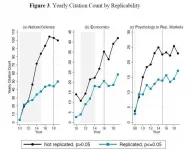(Press-News.org) Plant diseases don't stop at national borders and miles of oceans don't prevent their spread, either. That's why plant disease surveillance, improved detection systems, and global predictive disease modeling are necessary to mitigate future disease outbreaks and protect the global food supply, according to a team of researchers in a new commentary published in Proceedings of the National Academy of Sciences.
The idea is to "detect these plant disease outbreak sources early and stop the spread before it becomes a pandemic," says lead-author Jean Ristaino, William Neal Reynolds Distinguished Professor of Plant Pathology at North Carolina State University. Once an epidemic occurs it is difficult to control, Ristaino says, likening the effort to the one undertaken to stop the spread of COVID-19.
"We've seen how important information sharing, data analytics, and modelling have been in responding to the COVID-19 pandemic. These types of tools could also be leveraged to help build resilience to future plant disease outbreaks - from identifying risk in global crop trade networks to local citizen science monitoring," says co-author Graham MacDonald, Assistant Professor in the Department of Geography at McGill University.
While some diseases are already under some sort of global surveillance - such as wheat rust and late blight, an important pathogen that affects potatoes and caused the Irish famine - other crop diseases are not routinely monitored.
"There are a few existing surveillance networks, but they need to be connected and funded by intergovernmental agencies and expanded to global surveillance systems," says Ristaino. "We can improve disease monitoring using electronic sensors that can help rapidly detect and then track emerging plant pathogens."
Working together to protect crops
The researchers say the efforts from a wide range of scholars - so-called convergence science - are needed to prevent plant disease pandemics. That means economists, engineers, crop scientists, crop disease specialists, geneticists, geographers, data analysts, statisticians and others working together to protect crops, the farmers growing crops and the people fed by those crops.
Research is underway to model the risk of plant pathogen spread and help predict and then prevent outbreaks, they report in the paper. Modeling and forecasting disease spread can help mobilize mitigation strategies more precisely to stop pandemics.
Plant disease outbreaks are increasing
Global plant disease outbreaks are increasing in frequency and threaten the global food supply, the researchers say. Mean losses to major food crops such as wheat, rice and maize ranged from 21 percent to 30 percent due to plant pests and diseases, according to a paper published in 2019.
Take the case of bananas, specifically the Cavendish variety, which has no resistance to a specific pathogen called Fusarium odoratissimum Tropical race 4, which causes Panama disease. That pathogen spread rapidly from Asia to Africa, the Middle East and recently into South America, where it affects the main type of banana grown in the Americas for export.
Climate change exacerbating outbreaks
Climate change will likely exacerbate these outbreaks, the researchers say. In Africa, for example, climate change and drought in Saharan Africa affects the population and range of locusts, which devastate crops further south in sub-Saharan Africa. Climate data can help drive disease forecasting and spread models.
"More frequent rainfall can allow airborne plant pathogens to spread and fungal spores can move with hurricanes, which is how soybean rust came to North America from South America - via storms," says Ristaino, who also directs North Carolina State's faculty cluster on emerging plant disease and global food security. "There are also cases of early emergence, when pathogens emerge earlier in the growing season than usual due to warmer springs."
Further, the global nature of food trade is driving some plant disease pandemics. The emergence of new harmful plant pathogens adds other risks to the food supply, which is already strained by growing global demand for food.
"Globalization means that agriculture and food supplies are increasingly interconnected across national borders. Analyzing these crop trade networks combined with greater information sharing among countries can help to pinpoint risks from pests or diseases," says MacDonald.
The researchers say there is a need to link human global health and plant global health scientists to work together. Food security and livelihoods are linked to agriculture and human health is linked to the food we consume.
INFORMATION:
About the study
"The persistent threat of emerging plant disease pandemics to global food security" by Jean B. Ristaino, Pamela Anderson, Dan Bebber, Kate A. Brauman, Nik J. Cunniffe, Nina Fedoroff, Cambria Finegold, Karen A. Garrett, Christopher A. Gilligan, Christopher Jones, Michael Martin, Graham K. MacDonald, Patricia Neenan, Angela Records, David Schmale, Laura Tateosian, and Qingshan Wei is published in the Proceedings of the National Academy of Sciences.
DOI: https://dx.doi.org/10.1073/pnas.2022239118
About McGill University
Founded in 1821, McGill University is home to exceptional students, faculty, and staff from across Canada and around the world. It is consistently ranked as one of the top universities, both nationally and internationally. It is a world-renowned institution of higher learning with research activities spanning two campuses, 11 faculties, 13 professional schools, 300 programs of study and over 40,000 students, including more than 10,200 graduate students.??
McGill's commitment to sustainability reaches back several decades and spans scales from local to global. The sustainability declarations that we have signed affirm our role in helping to shape a future where people and the planet can flourish.
https://www.mcgill.ca/newsroom/
Neurotic personalities found the pandemic most traumatic, while agreeable and conscientious personalities offered protection from the pandemic's negative impacts.
INFORMATION:
Article Title: Which personality traits can mitigate the impact of the pandemic? Assessment of the relationship between personality traits and traumatic events in the COVID-19 pandemic as mediated by defense mechanisms
Funding: The author(s) received no specific funding for this work.
Competing Interests: The authors have declared that no competing interests exist.
Article URL: https://journals.plos.org/plosone/article?id=10.1371/journal.pone.0251984
...
Simon Fraser University researchers have validated a faster, cheaper COVID-19 test that could kickstart the expansion of more widespread rapid testing. Study results have been published in The Journal of Molecular Diagnostics.
"This research offers a cheaper, faster alternative to the most reliable and sensitive test currently used worldwide, without sacrificing sensitivity and reproducibility," says molecular biology and biochemistry professor Peter Unrau, who led the team evaluating the COVID-19 test kit.
The researchers suggest the test could be deployed in remote locations, clinics and airports due to its ease of use and portability.
The microchip real-time PCR test can provide ...
To meet soaring demand for lightning-quick mobile technology, each year tech giants create faster, more powerful devices with longer-lasting battery power than previous models.
A major reason companies like Apple and Samsung can miraculously pull this off year after year is because engineers and researchers around the world are designing increasingly power-efficient microchips that still deliver high speeds.
To that end, researchers led by a team at Brigham Young University have just built the world's most power-efficient high-speed analog-to-digital converter (ADC) microchip. An ADC is a tiny piece of technology present in almost every electronic piece of equipment that converts analog ...
For decades scientists have been puzzled by the formation of rare hyper-enriched gold deposits in places like Ballarat in Australia, Serra Palada in Brazil, and Red Lake in Ontario. While such deposits typically form over tens to hundreds of thousands of years, these "ultrahigh-grade" deposits can form in years, month, or even days. So how do they form so quickly?
Studying examples of these deposits from the Brucejack Mine in northwestern British Columbia, McGill Professor Anthony Williams-Jones of the Department of Earth and Planetary Sciences and PhD student Duncan McLeish have discovered that these gold deposits form much like soured milk. When milk goes sour, the butterfat particles clump together to form a jelly.
Q&A with Anthony Williams-Jones and Duncan McLeish
What did you ...
A team of researchers led by scientists at UC Santa Cruz analyzed data from 3,212 camera traps to show how human disturbance could be shifting the makeup of mammal communities across North America.
The new study, published in the journal Global Change Biology, builds upon the team's prior work observing how wildlife in the Santa Cruz Mountains respond to human disturbance. Local observations, for example, have shown that species like pumas and bobcats are less likely to be active in areas where humans are present, while deer and wood rats become bolder and more active. But it's difficult to generalize findings like these across larger geographic areas because human-wildlife interactions are often regionally unique.
So, to get a continent-wide ...
Free access to essential medicines increases patient adherence to taking medication by 35 per cent and reduces total health spending by an average of over $1,000 per patient per year, according to a two-year study that tested the effects of providing patients with free and convenient access to a carefully selected set of medications.
The findings, published May 21 in PLOS Medicine, come as advocates urge Canada to carve a path toward single-payer, public pharmacare. Canada is the only country with universal healthcare that does not have a universal pharmacare program.
A group of researchers led by St. Michael's Hospital of Unity Health ...
Papers in leading psychology, economic and science journals that fail to replicate and therefore are less likely to be true are often the most cited papers in academic research, according to a new study by the University of California San Diego's Rady School of Management.
Published in Science Advances, the paper explores the ongoing "replication crisis" in which researchers have discovered that many findings in the fields of social sciences and medicine don't hold up when other researchers try to repeat the experiments.
The paper reveals that findings from studies that ...
The human body is constantly exposed to various environmental actors, from viruses to bacteria to fungi, but most of these microbial organisms provoke little or no response from our skin, which is charged with monitoring and protecting from external dangers.
Until now, researchers weren't quite sure how that happened -- and why our skin wasn't constantly alarmed and inflamed.
In a study published May 21, 2021 in Science Immunology, scientists at University of California San Diego School of Medicine identify and describe two enzymes responsible for protecting our skin and body's overall health from countless potential microbial intruders. These enzymes, called histone deacetylases (HDACs), inhibit the body's inflammatory response in the skin.
"We have figured ...
Ionization energy is one of the most important physicochemical parameters. It is defined in terms of the amount of energy required to rip an electron from an atom. The dependence of the ionization energy on the atomic number determines the periodic law of chemical elements, which is assumed to be fundamentally constant. Based on the previously predicted effect of changing the electron mass, the research team showed that the ionization energy of atoms placed in photonic crystals with an ultrahigh refractive index can be significantly changed.
Photonic crystals ...
Despite the increasing frequency and severity of floods, storms, wildfires and other natural hazards, some firms in disaster-prone areas prepare while others do not.
That issue was examined in a new study by Jennifer Oetzel, professor, American University and Chang Hoon Oh, William & Judy Docking Professor of Strategy, University of Kansas published in the Strategic Management Journal (SMJ).
"Due to the increased frequency and severity of floods, storms, epidemics, wildfires and other natural hazards anticipated over the coming decades (according to the National Oceanic and Atmospheric Administration), there is growing pressure on managers and their ...




